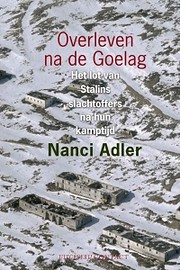

Cliquer sur une vignette pour aller sur Google Books.
|
Chargement... The Gulag Survivorpar Nanci Adler
 Aucun Actuellement, il n'y a pas de discussions au sujet de ce livre. aucune critique | ajouter une critique
Even before its dissolution in 1991, the Soviet Union was engaged in an ambivalent struggle to come to terms with its violent and repressive history. Following the death of Stalin in 1953, entrenched officials attempted to distance themselves from the late dictator without questioning the underlying legitimacy of the Soviet system. At the same time, the Gulag victims to society opened questions about the nature, reality, and mentality of the system that remain contentious to this day.The Gulag Survivor is the first book to examine at length and in-depth the post-camp experience of Stalin's victims and their fate in post-Soviet Russia. As such, it is an essential companion to the classic work of Alexander Solzhenitsyn. Based on extensive interviews, memoirs, official records, and recently opened archives, The Gulag Survivor describes what survivors experienced when they returned to society, how officials helped or hindered them, and how issues surrounding the existence of the returnees evolved from the fifties up to the present.Adler establishes the social and historical context of the first wave of returnees who were "liberated" into exile in Stalin's time. She reviews diverse aspects of return including camp culture, family reunion, and the psychological consequences of the Gulag. Adler then focuses on the enduring belief in the Communist Party among some survivors and the association between returnees and the growing dissident movement. She concludes by examining how issues surrounding the survivors reemerged in the eighties and nineties and the impact they had on the failing Soviet system. Written and researched while Russian archives were most available and while there were still survivors to tell their stories, The Gulag Survivor is a groundbreaking and essential work in modern Russian history. It will be read by historians, political scientists, Slavic scholars, and sociologists. Aucune description trouvée dans une bibliothèque |
Discussion en coursAucunCouvertures populaires
 Google Books — Chargement... Google Books — Chargement...GenresClassification décimale de Melvil (CDD)365.45Social sciences Social problems and services; associations Penal & related institutions Institutions for specific types of inmates Political prisonersClassification de la Bibliothèque du CongrèsÉvaluationMoyenne: (3.17) (3.17)
Est-ce vous ?Devenez un(e) auteur LibraryThing. |
||||||||||||||||||||||||||||||||||||||||||||||||||||||||||||||||||||||||||||||||||||||||||||||||||||||||||||||||||||||||
'Dat er onder het regime van Stalin miljoenen slachtoffers de dood vonden is bekend. Dat velen die dood in de Goelag vonden is ook bekend. Maar wat gebeurde er met hen die hun gevangenschap in de kampen wél overleefden? Overleven na de Goelag is het eerste boek dat uitvoerig ingaat op de ervaringen en het lot van Stalins slachtoffers na hun kamptijd. Nanci Adler baseerde haar onderzoek op uitgebreide interviews, memoires, officiële documenten en onlangs ontsloten archieven, en beschrijft wat overlevenden doormaakten bij hun terugkeer naar de maatschappij, hoe functionarissen hen hielpen of dwarsboomden, en hoe problemen rond hun bestaan zich van de jaren vijftig tot nu hebben ontwikkeld. Het resultaat is een essentieel werk op het gebied van de moderne Russische geschiedenis.
Recensie(s):
Dit is een onderzoek naar de terugkeer in de sovjetmaatschappij van gevangenen uit de stalinistische werkkampen. Zij werden eerder als paria's dan als helden beschouwd en moesten vechten tegen sociale en bureaucratische tegenstand. Zelfs na vrijlating en rehabilitatie waren een nieuwe baan, scholing en teruggave van geconfisceerd bezit allesbehalve vanzelfsprekend. Pas in de jaren tachtig en negentig vond een emancipatie van ex-gevangenen plaats. De auteur is senior-onderzoeker aan het Centrum voor Holocaust- en Genocidestudies in Amsterdam. Door de toevoeging van interviews met ex-gevangenen bevat dit wetenschappelijk opgezette boek zoveel human interest dat het een breed publiek kan boeien dat kennis wil nemen van de wrange gevolgen van dictatoriale onderdrukking en dat belangstelling heeft voor de Sovjet-Unie. Met notenapparaat, uitgebreide literatuuropgave en register.
(Biblion recensie, Louis Smit)